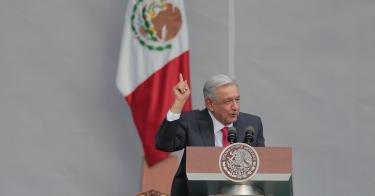China is not the only country pushing the U.S. around and being met with abasement and appeasement by the Biden administration. Much closer to home, the President of Mexico, always petulant, is growing ever more capricious not just in his statements but also in his actions.
Yet the administration pretends that President Andres Manuel Lopez Obrador (known as AMLO to everyone) behaves in a normal manner, and that the U.S.-Mexico relationship, never easy, is based on “mutual respect and shared interest.”
Let’s review the instances of “respect” and “shared interests.”
- AMLO has taken to saying that he’s conducting an “information campaign” to get Hispanics, and especially Mexican-Americans, not to vote for Republicans. He has identified Florida Gov. Ron DeSantis, a presidential candidate, as a main target. This egregious interference in the politics of another county is made even worse by Mexico’s assets in America, as will be explained below.
- Mexico’s president is also saying that he wants to cut a deal with his country’s powerful cartels, which already control parts of the country that AMLO’s government supposedly governs. These cartels are responsible for producing deadly drugs that have caused more than 100,000 overdose deaths in the United States.
- Yet AMLO denies Mexico’s involvement in the drug trade: “Here, we do not produce fentanyl, and we do not have consumption of fentanyl.”
- Instead, AMLO prefers to lecture the United States on our loss of values and how “decadent” we have become. Here we have some sympathy for AMLO; unlike with his other bizarre and bellicose statements, here he has identified a real problem. It is a bit rich, however, to hear moral reprimands from a man who wants to cut a deal with narco-traffickers.
- Lastly, AMLO has become uncooperative with even routine stuff, for example rejecting a request a Pentagon request that he open Mexican airspace to U.S. Air Force planes and drones that were investigating a balloon from China.
All of these eccentric comments and positions are sufficient to start asking whether Mexico, which has an almost 2,000-mile border with the United States (and which is open under Biden), can truly continue to be regarded as a friend of the United States.
>>> Is This Latin American Conservatives’ Last Chance?
The State Department and the White House chooses to play ostrich, as it did recently with regards to China when Beijing flew warplanes and sailed warships too close for comfort to our own in the Taiwan Strait recently.
A State Department official said to Fox News, “We continue to work closely with the Government of Mexico to advance a relationship based on mutual respect and shared interests.” The spokesperson said that the U.S.-Mexico relationship "is one of the most important, dynamic, and impactful partnerships in the world. We are both strong democracies with a commitment to ensure our democracies deliver for our people.”
But it’s a hard case to make, especially the parts about mutual respect and AMLO delivering for his people. This map from Global Guardian shows that great swaths of Mexico are either controlled or severely impacted by the Jalisco or Sinaloa drug cartels. “August of 2022 saw a significant increase in cartel-related violence across multiple areas of Mexico,” says Global Guardian.
The Biden administration may be tempted to think, well, he’s going after Republicans, and especially Ron DeSantis, who right now has a slight edge against Biden in a hypothetical race for the presidency. And it’s true that AMLO is pretty tough on the Florida governor. “Hopefully Hispanics in Florida will wake up and not give him one single vote, to not vote for those who persecute migrants, those who don’t respect migrants,” he said.
But that would amount to gross negligence, and using governance for the furtherance of one party. AMLO is interfering in our domestic politics, and it is the job of our government to tell him to stop.
Mexico has a long history of trying to exert influence on U.S. internal affairs, and of using its vast network of 53 consulates in the U.S., by far the largest of any country. This network is used to activate the more than 36 million Americans of Mexican descent (62 percent of the “Hispanic” population) to attain desired policy goals.
>>> China’s Global Influence Game
In the 2010s, for example, the Mexican consulate network provided field muscle for two of Barack Obama’s most controversial policy priorities, the Deferred Action for Childhood Arrivals (DACA) and the Deferred Action for Parental Accountability (DAPA), paying for processing fees, helping with applications, and providing one-on-one legal advice. In 2020, AMLO’s U.S. Ambassador urged Mexican Americans to respond to the U.S. Census.
And several Mexican presidents have behaved as though these Americans are still part of their fief. In 1997 President Ernesto Zedillo said he wanted a close relationship with Mexican-Americans, so they “could be called upon to lobby U.S. policy makers.” His successor Vicente Fox said in 2000, “Mexico is one nation of 123 million citizens—100 million who live in Mexico and 23 million who live in the United States.”
And Zedillo and Fox were rational players, not an erratic Marxist with a chip the size of Jalisco on his shoulder, constantly prattling on about Mexico’s past humiliations.
It’s time to draw a line.
This piece originally appeared in Disenso Fundación




